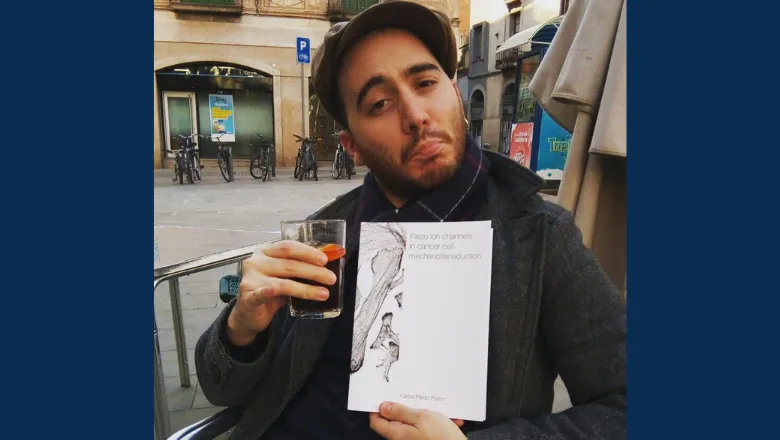25 April 2019
5 Minutes with… Carlos Pardo Pastor
Carlos Pardo Pastor is a Research Associate in Professor Jody Rosenblatt’s research group in the Randall Centre for Cell & Molecular Biophysics. His current research focuses on the role of Piezo1, a stretch-activated ion channel, determining proliferation, migration and extrusion in epithelia.

Briefly, tell me about your background and career up to this point at King’s?
I studied Human Biology, an MSc in Biomedical Research and a PhD in Biomedicine at Universitat Pompeu Fabra, in Barcelona. My first lab experience was as an undergrad, investigating basic ion channel biophysics in Barcelona and Valparaíso, Chile.
During my PhD, I got scooped twice (first as tragedy, then as farce) so I had to go with plan C. Luckily, mechanosensitive ion channels were being largely ignored by people working in mechanobiology, an emerging field at that time. My PhD supervisor is very open-minded and he gave me the freedom to collaborate with the groups of Kostas Konstantopoulos at Johns Hopkins in Baltimore and Xavier Trepat at IBEC in Barcelona to incorporate bioengineering approaches to study the role of Piezo ion channels in metastatic behaviour.
We published two papers on this topic and… here I am
What research are you currently working on?
My postdoc project focuses on the role of Piezo1, a stretch-activated ion channel, determining proliferation, migration and extrusion in epithelia.
What is a typical day like for you?
Waking up later than planned, working out less than desired, pipetting less than ideal… but this is work in progress, ok?
Where is your research area heading in the next 5 years?
I guess that we will be hit by the single-cell sequencing tsunami, and also mechanics in vivo will be further studied.
What would you like members of our school to most know about you and your research area?
I have a biology/ion channel background, but I tend to find interesting almost everything someone explains me.
What is your favourite part of your current role?
Being free to study what interests me while avoiding the majority of the administrative task that a PI does.
What do you do with your time outside of academia?
Currently, I ride my bike around London with the illusory aim of knowing it.
What advice would you give to your 18-year-old self?
STOP! Do not cut your hair-it will be gone soon, and you will miss it.
Who do you look up to (inside or outside of academia)?
A combination of my grandfather’s self-deprecating approach to life, my parents’ personal and professional trajectory and Bruce Springsteen’s on-stage presence. Or, you know, postmodern millennial middling survival may be also ok.
Any leaving remarks that you would like other members of our school to know about you?
Please, consider avoiding using red-green combinations in your figures. We, the colour-blind scientific collective, will appreciate your gesture-and will be able to finally discuss your work!
QUICK-FIRE:
Favourite Movie: Airplane! and Singing in the rain makes the perfect combo.
Favourite Book: Rayuela, by Julio Cortázar
Favourite TV Show: Plats bruts, a Catalan TV series of the early 2000s.
Favourite Scientist: I have two. Jorge Juan y Santacilia. At 22, he spent 10 years in South America as a member of the French Geodesic Mission to measure the length of a degree of meridian arc at the Equator. For this work, he was elected Fellow of the Royal Society. His memoirs of the expedition are an amazing mixture of scientific report and adventure novel. Later in life, he lived in London as a spy, investigating new naval construction methods. An amazing guy.
A more recent and significant figure is Marie Skłodowska Curie. Her work has paramount importance for our life, and she did that while struggling against very unfavourable social conditions. Admirable.
